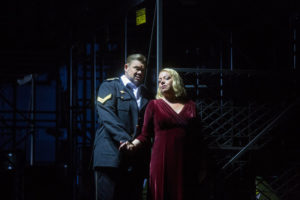THE HANGOVER REPORT – The Met’s trenchant new TRISTAN AND ISOLDE takes its audiences on a pitch black journey into the unknown
- By drediman
- October 18, 2016
- No Comments

Stuart Skelton and Nina Stemme in “Tristan und Isolde” at the Metropolitan Opera
Last night, I caught up with the Metropolitan Opera’s trenchant and ultimately transcendent new production of Wagner’s Tristan und Isolde. The challenging new staging, by Warsaw-based director Mariusz Trelinski, has been controversial, focusing less on the plot originally laid out by Wagner and more on Tristan’s metaphysical journey into the cosmos (i.e., death and beyond). Indeed, Mr. Trelinski’s production elicited a smattering of boos on opening night (the production commenced the Met’s season).
Act I takes place, conventionally and naturalistically enough, on a battleship heading from Ireland to Cornwall. However, as the opera unfolds, Mr. Trelinski’s dimly lit production starts to take on a more mystical shape. Act II still takes place on the battleship (the stark, brutal sets and projections are by Boris Kudlicka and Bartek Macias, respectively) – but now as the metaphorical manifestation of Tristan’s journey to the unknown – instead of Cornwall. The boundaries between reality and the metaphysical begin to blur. Act III completes the journey, taking place first in the muddled darkness of Tristan’s fading human mind and then in the mysterious pitch blackness of the beyond, concluding with an ecstatic if emotionally removed reunion with Isolde – not as we first met them, but something more akin to transfigured cosmic stardust.
I found Mr. Trelisnki’s take on this monumental opera to be quite profound, as I did the music-making. As the forbidden lovers, tenor Stuart Skelton as Tristan and soprano Nina Stemme as Isolde are extraordinary, creating exquisitely intimate portrayals that worked hand-in-hand with the director’s vision. Vocally, they were ravishing, particularly Ms. Stemme (who made such a sensational impact last season in the title roles of both Puccini’s Turandot and Strauss’s Elektra), giving perhaps the most vocally nuanced and penetrating performance of Isolde I’ve seen. Mr. Skelton is a fantastic match for Ms. Stemme, and he navigated the character’s internal/external journey with moving sensitivity and uncommon vocal beauty. He also handled Tristan’s notoriously difficult, hallucinatory Act III monologue with impressive intensity and stamina. These two were given equally terrific support by bass-baritone Evgeny Nikitin as Kurwenal, mezzo-soprano Ekaterina Gubanova as Brangäne, and the veteran bass René Pape as King Marke. Last night marked the great Simon Rattle’s final appearance in the pit (the remaining two performances will be conducted by Asher Fisch). He drew a gorgeously shaded and considered rendition of the score from the awesome Met orchestra, which I’ve rarely heard sound better.
HIGHLY RECOMMENDED
TRISTAN UND ISOLDE
Opera
The Metropolitan Opera
5 hours (with two intermissions)
In repertory through October 27

 Copyright © 2024
Copyright © 2024
Leave a Reply